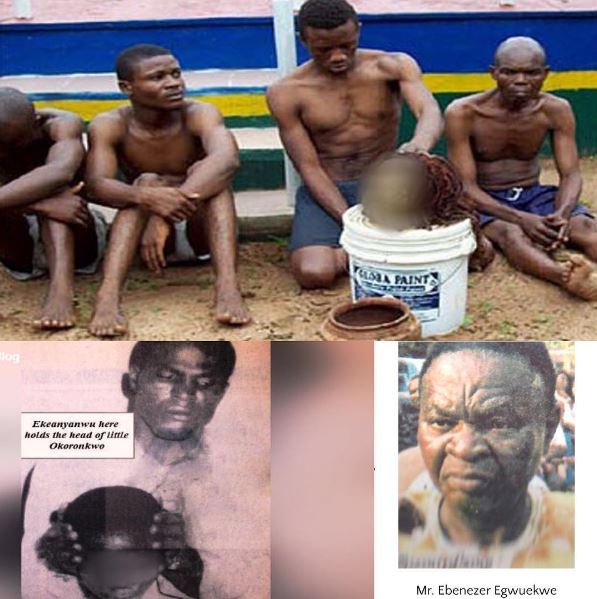
Chief Vincent Duru, one of the men convicted in the celebrated case of the ritual murder of an 11-year-old boy, Ikechukwu Okoronkwo, on September 19, 1996 in Owerri, Imo State, has reportedly been hanged.
His sentence said to have been carried out on Sunday, November 13, 2016, is coming 13 years after his 2003 conviction.
To refresh memories on the case, which became popularly known as the ‘Otokoto murder’ at the time, here are 20 things to know:
1. The victim, Okoronkwo, a groundnut seller, was lured into a highbrow hotel called Otokoko in Owerri and beheaded.
2. Okoronko was reportedly given a bottle of Coca-Cola that had been spiked with drug before he was killed.
3. The hotel was owned by Chief Vincent Duru, who became known as Chief Otokoto during the lengthy trial that followed his arrest.
4. Apart from being beheaded, the culprits reportedly removed different other organs from his body including his genitals before burying the corpse in a shallow grave.
5. The crime was discovered when 32-year-old Innocent Ekeanyanwu, who beheaded the boy left the hotel to deliver the head in a polythene bag to a client. An okada rider, who gave him a ride discovered the fresh human head and alerted the police later. Ekeanyanwu was intercepted by the police on his way back.
6. When the news of the boys’ murder broke, for many days, angry residents of Owerri trooped to the streets in what became known as the Otokoto Riots. Houses, hotels, supermarkets, and vehicles suspected to belong to the suspects and those suspected to belong to fraudsters or people of shady characters were burnt.
7. Ekeanyanwu was to deliver the boy’s head to an influential figure, Chief Leonard Unaogu at Eziama in Ikeduru Local Council Area of the state but Unaogu had reportedly travelled. He was said to have had no choice but to take the boy’s head to Owerri.
8. A popular photograph showing Ekeanyanwu holding the victim’s head was later released to the media, sparking the anger of Owerri residents.
9. In the ensuing riots, the residents burnt down Duru’s Otokoto Hotel and houses. They also destroyed the cars and a petrol station belonging to Eze Onu Egwu Nwoke. The homes of some government officials were not spared.
10. Just three days after his arrest, Ekeanyanwu was found dead in police custody. He was suspected to have been poisoned but the police released a statement to deny any foul play.
11. Three police officers were sentenced to death by hanging by an Owerri High Court in 2002 for their roles in the death of Ekeanyanwu, who was supposed to be the principal witness in the case.
12. Before his death, Ekeanyanwu had confessed that Unaogu was the brains behind the ritual killing syndicate he worked for.
13. Policemen who later searched the premises of Otokoto Hotel reportedly exhumed some bodies of people suspected to be victims of the syndicate.
14. When Unaogu was arrested, he denied knowing Ekeanyanwu, who was a gardener at the Otokoto Hotel during the time of the crime. Duru was also arrested and both he and Unaogu denied knowing each other during their trial, a claim rejected by the judge. Five others were arrested in connection with the case.
15. Trial of the suspects started on December 9, 1996.
16. Nwosu-Iheme sentenced all the seven suspects including Unaogu and Duru to death.
17. Unaogu would later die at the Port Harcourt Prisons in mysterious circumstances.
18. Duru, a native of Umudim Community in Ikeduru Local Government Area, of Imo State, appealed his conviction but the sentence was upheld by the Appeal Court.
19. During the Otokoto trial, Duru’s son, Obicheozor , was arrested in connection with a kidnapping case allegedly carried out by a gang he belonged to, Black Scorpions. In 1997, Obicheozor was executed by firing squad along with six others.
20. One of the convicted, Ebenezer Egwueke, would later appeal his conviction too and eventually found to be innocent. He was freed after 16 years in prison. By the time he was out in 2013, he was 62 years old.
Credits: The Punch













